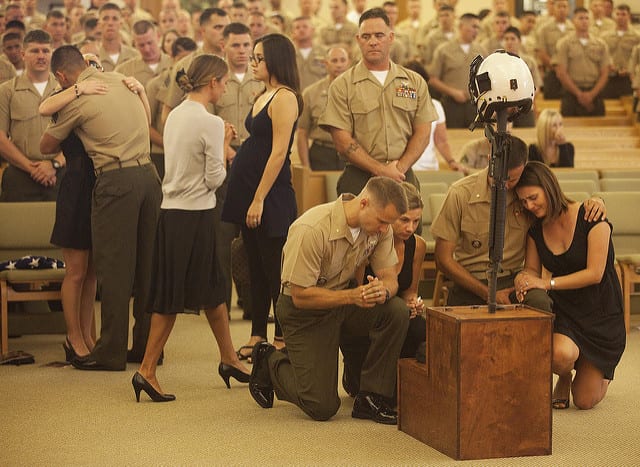The following excerpts come from Beyond Trauma by Dean Bonura.
…
The Biblical Concept of Grief
The Scriptures acknowledge the emotions of grief, anger, loss, and sadness. Grieving is appropriate and normal. Jacob grieved the loss of Joseph (Gen. 37:34–35). Job grieved his losses: his children, his prestige, his wealth, and his health. David grieved several losses: the loss of Saul and Jonathan (2 Sam. 1), the loss of Abner, his military commander (2 Sam. 3:31–39), and the loss of Absalom, his son (2 Sam. 18:31–19:1). Naomi suffered from multiple losses: her husband and her two sons (Ruth 1). Jesus grieved the loss of Lazarus (John 11:35), and he lamented the faithlessness of Jerusalem (Matt. 23:37–39). Grief is a universal emotion.
The Scriptures teach that God is the great Comforter of the soul, and those who grieve may not only experience God’s comfort themselves, but help others experience the same comfort by their own experience with loss (2 Cor. 1). Practitioners help the grieving by pointing them to the “God of all comfort” and allowing for the process of grief (2 Cor. 1:3; 1 Thess. 4:13).
 The Bible encourages believers to rest in the hope of eternal life (John 6:37–40; John 10:28; 1 John 3:2–3; 1 John 5:11–12; 1 Thess. 4:13–18; 1 Pet. 1:3–7), and to take courage in God despite temporal suffering and loss (Heb. 10:32–39; Job 19:25–26). Death is not the end; Christ’s victory over death provides the evidence for life beyond this world (1 Cor. 15). Indeed, Paul’s conclusions about death in 1 Corinthians 15 hinge on the resurrection of Christ: “And if Christ has not been raised, your faith is futile and you are still in your sins … But in fact Christ has been raised from the dead, the first fruits of those who have fallen asleep” (v. 17–18). In other words, Jesus’s resurrection guarantees the resurrection of all believers in Christ.
The Bible encourages believers to rest in the hope of eternal life (John 6:37–40; John 10:28; 1 John 3:2–3; 1 John 5:11–12; 1 Thess. 4:13–18; 1 Pet. 1:3–7), and to take courage in God despite temporal suffering and loss (Heb. 10:32–39; Job 19:25–26). Death is not the end; Christ’s victory over death provides the evidence for life beyond this world (1 Cor. 15). Indeed, Paul’s conclusions about death in 1 Corinthians 15 hinge on the resurrection of Christ: “And if Christ has not been raised, your faith is futile and you are still in your sins … But in fact Christ has been raised from the dead, the first fruits of those who have fallen asleep” (v. 17–18). In other words, Jesus’s resurrection guarantees the resurrection of all believers in Christ.
Jesus echoes this sentiment in what he says to Martha upon the death of Lazarus: “I am the resurrection and the life. Whoever believes in me, though he die, yet shall he live, and everyone who lives and believers in me shall never die” (John 11:25–26). First-century Christians at Thessalonica were reminded that their losses attended by grief were not without hope (1 Thess. 4:13). John, writing in the book of Revelation, concluded that there is coming a day when God “will wipe away every tear … and death shall be no more, neither shall there be mourning nor crying nor pain anymore” (Rev. 21:4).
Death for a Christian is not the end nor a loss, but rather an eternal gain (Phil. 1:21–24). The apostle Paul understood death as an appointed departure and a completion of a mission (2 Tim. 4:6–8). The psalmist, David, penned the beautiful poetry of the Shepherd’s Psalm, which promises God’s presence in the “valley of the shadow of death” (Ps. 23:4; see also Ps. 16). God will never leave or abandon his children (Heb. 13:5–6). He promises a place for them after death (John 14:1–3), bidding them to take comfort and courage from his promise of the resurrection (John 11:25–26). The death of a child of God is precious in the sight of God (Ps. 116:15). All of these facts temper the grieving process for believers and enable recovery.
…
Addressing Grief
One’s capacity to successfully deal with grief is often enhanced by the presence of a dynamic and sensitive network of caring people—family, friends, or a supportive congregation. The grieving person’s ability to reach reconciliation, while individually determined, will ultimately depend upon her or his willingness to live with loss, cope with pain, and move on with life.
 Healing from the wound of grief depends upon the grieving person’s willingness to talk about their pain and, frankly, the willingness of others to listen. Too frequently, others dismiss the grieving person’s loss too soon: “It’s time to move on; you need to get over your loss,” they admonish. But the multiple aspects of loss make the healing process complicated. How do you tell a soldier who has lost his legs or his friends, “You need to get over your losses and move on?” How do you tell a grieving spouse, “You’ll have to learn to cope without your spouse and raise your children without that parent?” You don’t.
Healing from the wound of grief depends upon the grieving person’s willingness to talk about their pain and, frankly, the willingness of others to listen. Too frequently, others dismiss the grieving person’s loss too soon: “It’s time to move on; you need to get over your loss,” they admonish. But the multiple aspects of loss make the healing process complicated. How do you tell a soldier who has lost his legs or his friends, “You need to get over your losses and move on?” How do you tell a grieving spouse, “You’ll have to learn to cope without your spouse and raise your children without that parent?” You don’t.
The first step—and perhaps the most important—is to grant the victim permission to grieve. Sometimes people feel like they don’t deserve to grieve. But we must affirm their loss and allow for grief; or in some cases, honoring a person’s reasons for grieving. Encourage the grieving person to talk about pain and loss. “Pain shared is pain divided.” Allowing for verbal expression enables the mourner to acknowledge grief, identify fears, and focus on assets, not just losses.
…
These excerpts pulled from Beyond Trauma by Dean Bonura.
Photos:
Once A Marine…Always A Marine by the U.S. Marines. Licensed under U.S. Govt. Work.
Coping with the loss of fallen Marines by the U.S. Marines. Licensed under U.S. Govt. Work.







